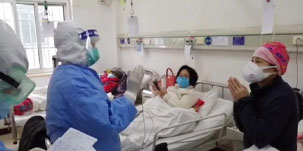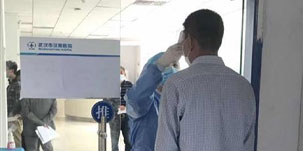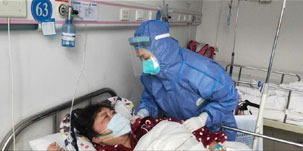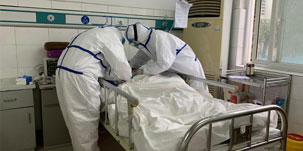A 60-year-old Woman with Respiratory and Cardiac Arrest Caused by COVID-19 Ate on Her Own after 20-days Rescue in Hanyang Hospital
“Thank you, thank you very much! When my mother was rushed to the hospital by 120, her breath and heartbeat were gone. You gave her a second life. Now she is getting better day by day and can eat by herself today. I finally feel at ease at the isolation point.” On the morning of February 13, after receiving a phone call from the doctor of Hanyang Hospital in Wuhan, Mrs. Wang’s daughter said excitedly.
Respiratory and Cardiac Arrest Caused by COVID-19
Ms. Wang, 60 years old, who lives in Wangjiawan, Hanyang, usually has basic diseases of high blood pressure and diabetes. Since Mid-January, Ms. Wang began to feel feverish and tired, and was uncomfortable. After intermittent infusion treatment in the community hospital, her physical status was still unstable, and her health was not completely improved. Until the morning of the first day of the Lunar New year, January 25, her family found that Ms. Wang was lying in bed, unconscious and could not be waken up, and they immediately dialed 120 for help.
Ms. Wang's daughter said ,”when my mother was not feeling well, she always felt bitter and no taste and had to drink two bottles of soda a day. This situation went on for three days, and there was no way to stop it. The night before the incident, she did not seem to be in condition, but still watching TV and chatting with us. Unexpectedly, after nine o'clock that morning, I asked her to have breakfast but only to find her lying in bed, unconscious, regardless of our shout.” Professor Zuo Xiaobing, director of emergency medicine at Hanyang Hospital, said that Ms. Wang had stopped breathing and had no heartbeat at that time, and lost consciousness completely. Medical staff immediately began cardiopulmonary resuscitation (CPR), and endotracheal intubation was performed immediately. Then the machine on her finger showed that her blood sugar was high. In order to save time, Director Zuo arranged a series of tests for Ms. Wang, including blood gas analysis, urine routine, electrolytes, liver and kidney function, blood routine, chest CT, etc. while they were trying hard to increase her blood pressure, reduce her blood sugar and give the infusion. Almost 10 minutes later, Ms. Wang's heartbeat and breath recovered, but she was still unconscious. There are multiple patchy ground glass shadows in Ms. Wang’s both lungs. Taking other symptoms into consideration, Ms. Wang was initially diagnosed with diabetic ketoacidosis and suspected COVID-19 and then was admitted to the first ward of the respiratory department.
Qin Yonggang, an associate professor, explained that Ms. Wang’s deterioration to respiratory and cardiac arrest was mainly due to the delay of her treatment. When Covid-19 progressed rapidly, diabetic ketoacidosis was the catalyst.
Good Psychological Defense Facilitate Fighting Against the Epidemic
"Ms. Wang was intubated with an endotracheal tube when she was admitted to the hospital. If her airway were opened, the surrounding environment would produce aerosols and there would be a high risk of infection. Her condition was really critical, but we all had the belief that we must snatch her back from death, though she has been critically ill for many times in the process." Said Qin Yonggang, the deputy director of the first ward of the respiratory department of Hanyang Hospital. On the third day after admission, Ms. Wang's nucleic acid test showed positive and she was diagnosed with COVID-19, but not a single medical staff flinched.
During her stay in hospital, Ms. Wang mainly received comprehensive symptomatic treatment such as ventilator-assisted ventilation, antiviral, anti-inflammatory, and blood sugar control. In addition to drug treatment, what is more important is that doctors and nurses, patients and their families had jointly set up a solid psychological line of defense. Qin Yonggang said, “Every time we make rounds of the wards, we would hold Ms. Wang's hands and say in her ear that she is recovering well. And she should take more rest, eat more, and can also use her mobile phone to get in touch with her family more. We used close-up actions to make her no longer afraid and cheer her up.” Not only to Ms. Wang, but also to all the ward patients, the first thing doctors and nurses do is to help them build up confidence in overcoming the disease, so then they can see their patients’ spirits getting better day by day and them recovering quickly.
Wu Bangyin, the doctor in charge of the patient, made bedside rounds at least twice a day. He always carefully explained Ms. Wang’s disease condition and his advice during shift handovers, never forgot to call from home late at night to inquire about her illness, and often went to the ward to feed her water and taught her how to exercise herself to restore lung function. Because of the risk of cross-infection, family members were forbidden to accompany the hospitalized. During this period, nutritional support completely depended on nurses mashing and injecting food through gastric tubes. Apart from oral care and pressure sores care, nurses often did psychological counseling for Ms. Wang on a regular basis.
“Keeping psychological defense is really important for recovery,” said Associate Professor Qin Yonggang,” I had a ball friend who was hospitalized because of COVID-19. At that time, his CT photo suggested that both lungs were white and he was expected to have difficulty in breathing soon. After his being hospitalized, the medical team cheered him up every day and helped him build up the confidence to overcome the disease. After about ten days, he got better and was quickly recovered and discharged from the hospital.
Off the Ventilator after 10 Days and Eat on Her Own after 20 Days
On February 3, the 10th day of her stay in hospital, Ms. Wang successfully got off the ventilator, removed the endotracheal intubation, and began to breathe on her own.
“Although she still had poor lung function and was too weak to speak, when she became conscious that day, she thumbed up for us, trembling, full of tears. We were also much moved”, said associate Professor Qin Yonggang.
When Ms. Wang's daughter, though still in isolation, knew that her mother was getting better, her suspended heart finally relieved. She said, “Thank the doctors and nurses in Hanyang Hospital, also thank the unknown care worker, an aunt who used her phone every day to let me video with my mother. Although my mother can't talk for the moment, seeing her eat soft noodles and porridge and her state better day by day, I was really touched.”
Wu Bangyin, the doctor in charge, said that up to February 13, Ms. Wang, who had been hospitalized for 20 days, began to eat on her own, and was now in the stage of recuperation and functional recovery.
Qin Yonggang, associate professor of Respiratory Medicine Department, the first ward of Wuhan Hanyang Hospital suggested that the general public must listen to the arrangement during the epidemic period, avoid going out, strengthen nutrition, do protect themselves, wash their hands frequently, and often keep the room ventilated. Once found fever, cough and fatigue, report to the community in the first time. With early diagnosis and early treatment, many patients can be cured, so they must have the confidence to conquer the disease. In addition, he suggested residents should not take in so-called prophylactic agent, for any drug can be harmful to the body in some extent, which may turn out to be the opposite of their wish.



 医院动态 / Popular science of health
医院动态 / Popular science of health




